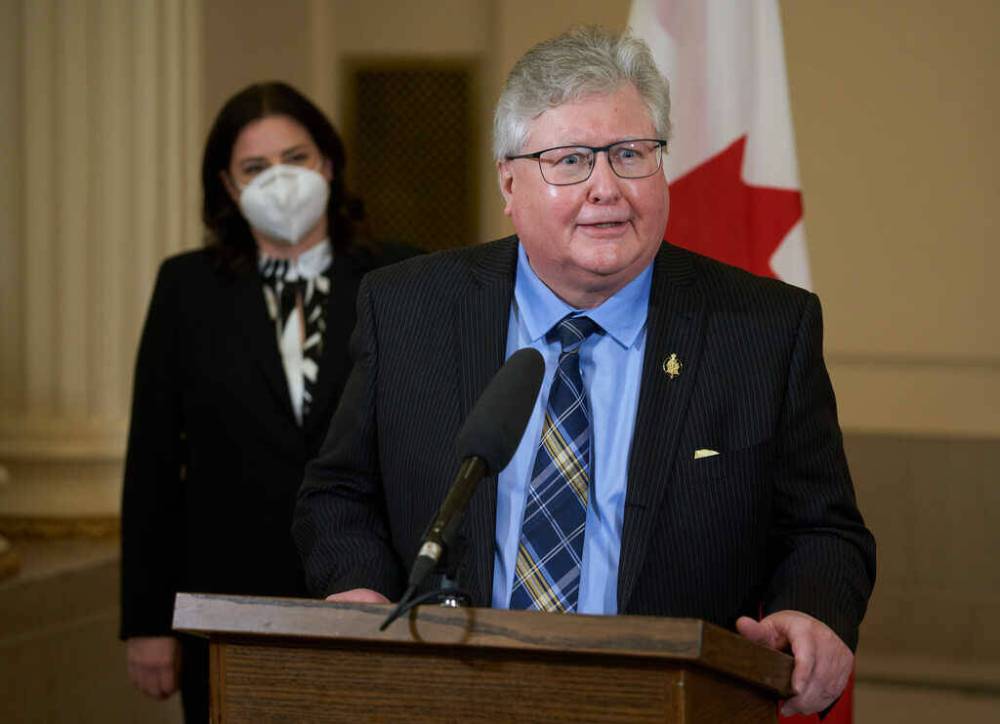Manitoba tabs $16M for long-term care staffing
Advertisement
Read this article for free:
or
Already have an account? Log in here »
To continue reading, please subscribe:
Monthly Digital Subscription
$19 $0 for the first 4 weeks*
- Enjoy unlimited reading on winnipegfreepress.com
- Read the E-Edition, our digital replica newspaper
- Access News Break, our award-winning app
- Play interactive puzzles
*No charge for four weeks then billed as $19 plus GST every four weeks. Offer only available to new and qualified returning subscribers. Cancel any time.
Read unlimited articles for free today:
or
Already have an account? Log in here »
Hey there, time traveller!
This article was published 16/06/2022 (923 days ago), so information in it may no longer be current.
The Progressive Conservative government will spend more than $16 million to add desperately needed staff to the province’s long-term care sector, appealing to Manitobans to join the pandemic-weary workforce.
Seniors and Long-Term Care Minister Scott Johnston said the new money will go towards recruiting and hiring 350 health-care aides and 72 registered and licensed practical nurses to Manitoba’s 125 licensed personal care homes.
“We’re here to reinforce our government’s commitment to seniors in the province of Manitoba,” Johnston said Friday, during a media event outside Deer Lodge Centre in Winnipeg.

The funding will come from the department’s new $55-million budget, and will increase staffing ratios to 3.8 hours of resident care per day from 3.6, Johnston said. “It is the position of the department and the government that we continue to increase.”
For years, personal care home operators and health-care unions have called for staffing ratios to be increased to 4.1 hours of resident care per day. The minister did not say what the department’s preferred ratio would be, but noted a needs assessment is underway.
“Once we finish that evaluation, we’ll have more of an understanding of exactly what degree we want to go to,” Johnston said.
However, Health Minister Audrey Gordon acknowledged adding the promised 400-plus workers to boost staffing ratios will take time. She said a pan-Canadian solution to shortages within health care is required.
“At the provincial level, (we) are working diligently to ensure that we’re using all the strategies that we can employ to make health care an attractive place to work,” Gordon said. “We want to see more individuals coming into our health-care system.”
Implementing a robust workforce plan for care homes and increasing staffing levels were two of the 17 recommendations put forward by Lynn Stevenson, a former B.C. associate deputy minister hired to investigate the deadly COVID-19 outbreak at Maples care home in Winnipeg in fall 2020. Seventy-four staff and 157 residents were infected, and 56 people died.
The province will also spend $1.5 million on tuition supports and to provide recruitment incentives. An unspecified portion of the funding will go towards improving oversight for medical services and infection prevention and control.
Kathy McPhail, chairwoman of the Stevenson review implementation team, appealed to people searching for a career to consider the personal care home sector, adding financial supports may be available.
“Although we would all like to see new staffing resources, all of them there immediately, the system requires time to educate and train staff and those tuition and recruitment investments are key to that effort,” McPhail said, adding the government know more workers will be needed.
“These are the building blocks of the transformation of personal care homes in Manitoba.”
Manitoba Association of Residential & Community Care Homes for the Elderly vice-chairwoman Laurie Cerqueti said funding and recruiting additional staff is a step in the right direction. Cerqueti expects to see some improvements to staffing in the short term, but said there remains a long way to go.
“As much of we’re glad to see funding for all of these other things, operational funding has been non-existent for probably the last 15 years, and when you look at how the cost of things has risen over the last year alone it is significant,” Cerqueti said. “It is difficult for operators to balance a budget.”
The funding is the first investment in staffing in 15 years, Long Term & Continuing Care Association of Manitoba executive director Jan Legeros said, and is welcome news for the sector. However, additional spending to improve the quality of life for residents is needed.
“Our seniors need to be engaged and active,” Legeros said. “They could, with the assistance of occupational therapists, physiotherapists, social workers, rehabilitation and recreational staff in long-term care enjoy a much higher quality of life.”
The seniors minister said a boost to operational funding for personal care homes is under consideration by the provincial government.
Meantime, CUPE 204 president Debbie Boissonneault said the new positions will likely be filled by temporary and uncertified health-care aides already working in the system.
“We need full-time, permanent staffing increases, and we need mandatory legislated minimum staffing requirements in long-term care,” Boissonneault said Friday.
The union, which represents health-care support staff, voted in favour of a strike last summer, after going five years without a contract. Negotiations are currently in mediation.
Manitoba NDP Leader Wab Kinew said the provincial government has fought health-care workers and reduced training opportunities.
“We know seniors need more direct care hours, and government should be aiming to meet the four-hour ratio,” Kinew said. “Seniors deserve a government that tackles the staffing shortage in PCHs immediately, not sometime in the future.”
danielle.dasilva@freepress.mb.ca

Our newsroom depends on a growing audience of readers to power our journalism. If you are not a paid reader, please consider becoming a subscriber.
Our newsroom depends on its audience of readers to power our journalism. Thank you for your support.

